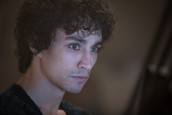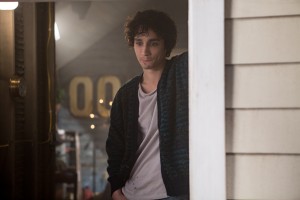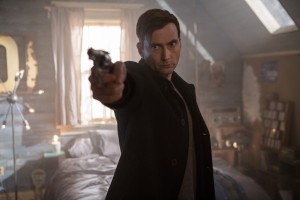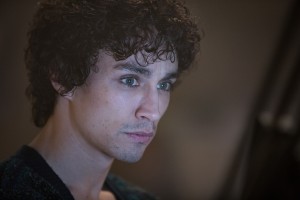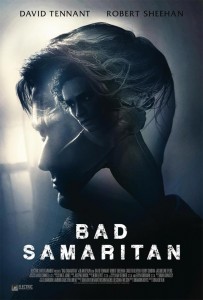In the thriller BAD SAMARITAN, opening today, Robert Sheehan stars as Sean Falco. Sean is a young Irishman living in Portland, Oregon, where he works as a parking valet – and moonlights as a burglar, using the tech inside the cars to get into the owners’ homes while they’re dining. Directed by Dean Devlin and written by Brandon Boyce, BAD SAMARITAN explores what happens when Sean stumbles upon a kidnap victim (Kerry Condon) in a home he’s planning to rob. Too scared to free her, Sean flees. Consumed with guilt, Sean promptly resolves to save the woman, which puts him in the crosshairs of psychopathic kidnapper Cale Erendreich, played by David Tennant.
Sheehan worked with director Devlin before on the film GEOSTORM. The actor produced and starred in the film JET TRASH and can currently be seen in Netflix’s film MUTE as a gender non-binary character and in GENIUS: PICASSO as Carlos Casagemas, one of the title character’s best friends. Sheehan’s other credits include the films THE MESSENGER, MOONWALKERS, ANITA B., THE MORTAL INSTRUMENTS: CITY OF BONES, RED RIDING, KILLING BONO, and SEASON OF THE WITCH. On television, Sheehan’s work includes roles in FORTITUDE, MISFITS, and LOVE/HATE.
Like his BAD SAMARITAN character, Sheehan hails from Ireland. On a warm April day, Sheehan therefore elects to enjoy the California sunshine, so this interview takes place on the balcony of a suite at West Hollywood’s London Hotel. Sheehan responds with great candor to some questions that others might deflect.
ASSIGNMENT X: You’ve worked with director Dean Devlin before …
ROBERT SHEEHAN: I had, yes indeed, on GEOSTORM. I had a smaller part in that, was there for quite a few weeks filming, so got to know him to some degree. Of course, he was the writer/director/producer of that, so he was pretty snowed under the whole time, so we got to know each other in a much better capacity when we embarked on this baby.
AX: What’s Dean Devlin like as a director?
SHEEHAN: Everybody brought what they felt the character was. We all went off into our corners, and we did the work on our characters, and we brought that to the set, and we did a little bit of rehearsal, which involved getting it out there, exchanging ideas, and playing around with dialogue. He’s very collaborative in that respect, and also incredibly decisive, because when you have very, very few days to shoot something of this complexity, you have to have a captain who’s very decisive. So he’d come into a set, like Cale’s house, for example, and just go, “Right, we’re going to start the camera here, it’s going to pan down, going to track across, and then, whoosh, right over there.” And he walks into a space and saw the scene and had it all story-boarded. So you always felt the ship was moving in the right direction, I think.
AX: Have you ever had any sort of moral dilemma on the scale of Sean’s, where you were thinking, “I know this secret, and I should do this about it, but if I do that, I’m opening myself up to trouble”?
SHEEHAN: Well, not quite to that scale. I remember once, I was on Venice Beach with a friend, and there was a bunch of guys walking down the street, and there was a girl shouting lots and lots of abuse at one of the guys. And then one of the other guys came over and hit her, and knocked her to the ground. And we were about fifty yards up the boardwalk. And she sort of bounced straight back up, looking at him, a bit dazed. And nobody did anything. It was a really horrible moment, because what do you do? Do you jump in there, guns blazing? Is that the right thing to do? I don’t know. That one springs to mind. But what we didn’t do was jump in, guns blazing. We turned and walked off. Which is a bit embarrassing, to be honest with you, but there you go.
AX: Sean spends most of BAD SAMARITAN in a state of extreme guilt. Did you break character a lot between scenes just so you weren’t feeling, “Guilt, guilt, guilt” for the length of the shoot, or did you stick with it and then have to go somewhere extra-cheerful to decompress afterwards?
SHEEHAN: [laughs] It’s tiring, the old guilt, I’ll tell you that, to keep it sustained throughout the day, but the exhaustion helped. The physical and mental exhaustion of playing this character helped to play the character. So even though it was painful at the time, there was a perverse satisfaction in knowing that the pain was somehow improving the performance. That’s not a very healthy thing to say, is it? [laughs] That sounds not at all healthy mentally, but there you go.
AX: There’s an immense amount of action, especially in the latter parts of the film. When you were running around in the snow, and digging and hitting and running and rolling, was that fun or was that more mental exhaustion where you were going, “Hey, I should be over the guilt now, but I’m just so tired that it’s staying”?
SHEEHAN: I quite enjoy that stuff, to be honest. Not too grueling for me, the fast-paced, action-y type stuff. I love doing all that. So that was really enjoyable, actually. The one challenge about doing all the running around stuff near the end was just the cold, the bitter, bitter cold that we were enduring. But again, that kind of helps in a weird way.
AX: Did you do any sort of research for any aspect of Sean?
SHEEHAN: Well, in terms of methodical acting stuff, no, but you have to, I think, rely on the material, spend some time as the character, as much time as you can, and have a very distinctive emotional map in your head as to where you start, where you middle, and where you end. But in terms of research and car park valet and stuff like that, no, I was just operating straight from the material, to be honest.
AX: How long were you actually shooting on BAD SAMARITAN?
SHEEHAN: Overall, about eight weeks. That meant specifically about thirty-five, thirty-six days of filming.
AX: Did you have rehearsal time?
SHEEHAN: We did. We didn’t have a huge amount. Me and Carlito Olivero, who plays Derek [Sean’s fellow valet and partner in burglary], we had a good bit separately with Dean. And David came quite late, because he was doing a project straight up to the beginning of filming. But there would have been little good in our rehearsing, David and I.
AX: Well, you really only have a couple of scenes where you’re physically in the scene together. Had you worked with or encountered David Tennant before?
SHEEHAN: Never. I only knew him from his work, God bless him. I only knew him from his stuff, which of course I’d seen plenty of, on U.K. television. So I didn’t know him very well. He was very sweet, actually. The first time we met, he was in the makeup trailer, and I came in, and I’d been shooting. And he was in, doing hair and makeup tests, and he went, “Oh, hello, Rob. I’m a big fan of yours.” [incredulous laugh] “You’re a big fan of mine? That’s very generous to say. I don’t think you mean it, but thank you, that’s very nice.” He’s a very sweet man, very lovely fellow.
AX: When you decided to do it, was there any discussion about keeping your normal speaking voice, as you do, or trying to do an American accent?
SHEEHAN: It came about in such a way that Dean said to Brandon Boyce, who wrote the script, “You know, I really like this little cheeky bollocks from Ireland called Robert Sheehan, so can you do a pass where the character is” – I think he probably said the character is British or something, but we’ll forgive him that. I don’t know if he said that, I’m putting words in his mouth, but anyway, Brandon rewrote the script [so that] the character was English. And the character remained English for awhile, over a couple of drafts. I was in Perth, Western Australia, doing a film, and me and Dean were talking about it on the phone, and I was like, “We’re both in agreement – if we’re going to make him English, we might as well just make him Irish. I mean, what’s the – why would we sort of divorce him sort of one degree to England?” And universally speaking, the Irish accent is much more charming [laughs], so you win points straight away with the audience there, don’t you?
AX: David Tennant is Scottish, but plays an American. Do you know if there was any discussion of him speaking with his normal voice?
SHEEHAN: I don’t know for sure. I think that they wanted to keep Cale American, they wanted to keep Cale a big, rich American guy.
AX: Well, the investigation side of the story could get very tangled if Cale was not American …
SHEEHAN: Yeah. It opened up a good can of worms for Sean, but I think it would have opened a bad one for Cale, being foreign, that is.
AX: Kerry Condon, who plays Katie, the woman Sean is trying to rescue, is also from Ireland, but she’s playing American like David Tennant …
SHEEHAN: Yeah, she was in [the American accent] most of the time. It was only the odd time she’d come over and visit at the house, she’d just be back to the normal Irish accent. So I got used to her with the American accent, really. She’s the most charmingly, curmudgeonly, lovely person. We had a great laugh. Because we’re from very near. She’s from Tipperary, I think, and I’m from County Laois, which borders Tipperary. So we’re from the same neck of the woods, so we speak the same language. She’s so funny, Kerry, she’s hilariously funny.
But it was unpleasant at times, to be honest, when she was all chained up. It’s not very nice. It’s a bit disturbing to work with that. You know you’re playing pretend, but tying someone up like that, they’re automatically in distress. We tried to make all that stuff as quick and brief as possible, especially having to put the gag ball back into her mouth. It wasn’t very nice for anyone, really, to be there.
AX: Was she actually bound to the chair, or could she get up if she needed to, for instance, use the restroom …?
SHEEHAN: She’s chained in there. They could get her out pretty quick, but she was chained in.
AX: How much did you work with the fight choreographer?
SHEEHAN: At one point, because of schedule, the stunt guys were shooting in tandem to us, over there, as we were doing this. But in terms of the fight stuff, most of that is us, myself and David. We got there on the day, and just practiced it, and figured out what it was going to be, what Dean wanted, and it wasn’t too wildly complex.
AX: Had you worked in Portland, Oregon before?
SHEEHAN: No, never.
AX: How was it?
SHEEHAN: It was fab, really fab. Everybody there knows Dean well, because they’ve all worked on his telly shows for years. And I had a little house to myself, which was lovely, across the river in this very quiet area, just beside Mississippi Avenue, which is a lovely, quiet little hipster-y neighborhood. So on my days off, my Sundays, I’d just go puttering down and get a cup of tea and a cake, and not do very much, really. So yeah, it was a lovely place to film. The highlight was going way out to greater Oregon, outside of Portland, seeing what Oregon actually looks like. So I’ll go back definitely to Oregon for a visit, a holiday, because they’ve got hot springs there, and micro breweries. They have all my favorite things.
AX: Do you have any other projects going on we should know about?
SHEEHAN: Yes. There are a couple of things. The Peter Jackson-produced project, directed by Christian Rivers, called MORTAL ENGINES, that’s going to come out in December. And then in the first quarter of the following year, a series for Netflix called THE UMBRELLA ACADEMY. I’m shooting that currently, and that’s going to be all manner of bonkers, that show. Look forward to that first quarter of next year.
AX: What would you most like people to know about BAD SAMARITAN?
SHEEHAN: I think I would want people to know that they should take a few friends and see it in a group, because it’s far more enjoyable. I think it’s like the choice between going on a roller coaster alone, or with friends. Because I’d really liken the film to a cinematic roller coaster. Yeah, we’ll say that, why not?
Related: Interview: David Tennant and screenwriter Brandon Boyce chat new thriller BAD SAMARITAN
Follow us on Twitter at ASSIGNMENT X
Like us on Facebook at ASSIGNMENT X
Article Source: Assignment X
Article: Exclusive Interview: Robert Sheehan plays cat and mouse in new thriller BAD SAMARITAN
Related Posts:




